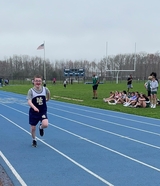From Fatigue to Fulfillment: How the Hypoglossal Nerve Implant Changed Logan’s Life
From Fatigue to Fulfillment: How the Hypoglossal Nerve Implant Changed Logan’s Life
15-year-old Logan loves running track. But it was only a few years ago that constant exhaustion kept him from reaching his full potential – both in sports and at school. It was difficult for Logan to fall asleep, and even harder to wake up in the morning. His fatigue magnified his ADHD symptoms, making it harder to focus during the school day and leaving him drained in the afternoons. Logan has Down syndrome (also known as trisomy 21), which made it challenging for him to explain the full extent of the problem to his parents. It wasn’t until Logan was referred to Children’s Hospital of Philadelphia (CHOP) that the underlying issue was revealed.
Experts in CHOP’s Division of Otolaryngology (Ear, Nose and Throat) sent Logan for a sleep study, which showed he had obstructive sleep apnea. Sleep apnea happens when a child briefly stops breathing during sleep and can be common in children with Down syndrome. Logan was prescribed CPAP (continuous positive airway pressure) therapy to help him breathe at night. A CPAP machine uses a hose connected to a mask to deliver constant air pressure that keeps the airways open. One of the most common treatments for sleep apnea, the CPAP machine posed new challenges for Logan and his family.
“It was a nightmare,” says Logan’s mom, Teresa. Logan sleeps on his stomach, which meant the mask pressed into his face, preventing it from delivering the pressurized air Logan needed. Irritated by the mask, Logan often took it off in the night. In addition, he sometimes chewed on the mask in his sleep, leaving him at risk of swallowing a piece of plastic. Even switching to a BiPAP (bilevel positive airway pressure) machine, which can sometimes be more comfortable for individuals with complex respiratory issues, did little to solve the problem.
“We tried everything to help him sleep better,” Teresa says. “Weighted blankets, melatonin. Nothing worked. He had more bad days than good. I knew there had to be a better option.”
An innovative option, only at CHOP

In the Fall of 2022, Teresa learned about a new treatment at CHOP specifically for kids like Logan. The hypoglossal nerve implant is a surgery to treat severe sleep apnea in people who can’t tolerate traditional therapies like the CPAP machine. The device monitors breathing at night and uses a cuff around a nerve under the tongue to gently move the tongue forward, keeping the airway open during sleep. The nerve implant device is turned on and off with a remote. It has been shown to significantly reduce sleep apnea episodes, decrease snoring and improve daytime alertness.
The treatment is currently FDA-approved for individuals ages 13-18 with Down syndrome. CHOP is also participating in a research study evaluating the treatment's effect on thinking skills and communication for individuals ages 10-21 with Down Syndrome. CHOP is one of the only local pediatric programs offering the treatment to children.
“I read the research about the improvements in adults,” Teresa says, “so I contacted Ashley Williams [MSN, CRNP, CORLN] and told her we were interested in participating.”
Lifechanging results
On March 10, 2023, Logan underwent hypoglossal nerve implant surgery at CHOP. After surgery, the medical device stayed turned off for one month, giving Logan’s body the chance it needed to heal after surgery. Although recovery was a challenge, Logan has now adjusted to the implanted device. He turns it on as part of his bedroom routine and off when he wakes up in the morning.
Sleep studies since surgery have shown that Logan has had almost no sleep apnea episodes, and with enough sleep, his quality of life has dramatically improved. “He wakes up more refreshed and has the energy and stamina to get through his day,” says Teresa.
Now at track meets, Logan sprints through the 100m and 200m with ease. He’s also joined a community theater, performing multiple nights each week during a show’s run, and handling even the most intense rehearsal periods without challenges. Teresa also notes that Logan seems better able to communicate his thoughts and express himself more clearly.
“As a parent, you question everything,” she says. “But seeing the outcome now, we have no regrets. This has given Logan the opportunity to have the best quality of life he can. It has truly been lifechanging.”